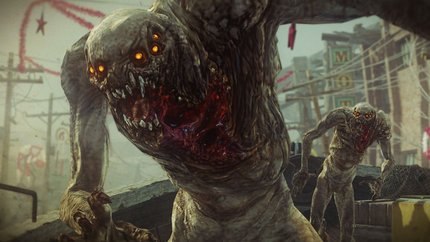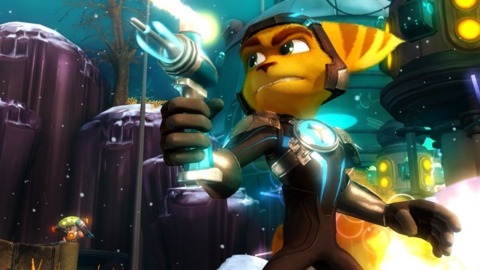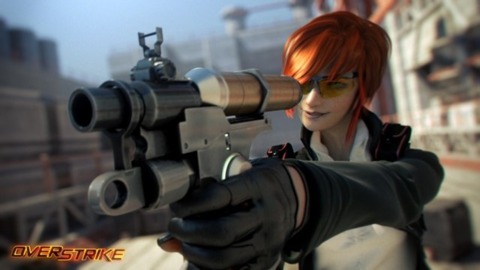No 'right' way to do social games - Insomniac CEO
Q&A: Resistance and Overstrike developer's Ted Price talks about trying to find a foothold in the new world of games with Insomniac Click, whether the social market is a bubble waiting to burst, and launching a new IP with new hardware.
In the last two months, Insomniac Games has launched new PlayStation 3 games in its two trademark Sony-exclusive franchises: Resistance 3 and Ratchet & Clank: All 4 One. The company's only announced-yet-unreleased project is the squad-based shooter Overstrike, a new intellectual property and the studio's first multiplatform project ever.

Insomniac's expansion isn't limited to platforms. The studio has also established a new social-focused Insomniac Click division, and All 4 One marks the debut of Insomniac's offshoot North Carolina shop.
During last week's International Game Developers Association Leadership Forum, Insomniac president and CEO Ted Price sat down with GameSpot to talk about his studio, the game industry at large, and the rapid expansion of both. The chief of Insomniac addressed the staying power of social games, the balance between listening to game designers and listening to gamers, and why it benefits a developer to launch new intellectual property on new platforms.
GameSpot: Where do you see the social and mobile space now that there has been a bit of time since the announcement of Insomniac Click?
Ted Price: Things are changing every day in that space. I think that is what's so exciting about dipping our toes into that particular ocean. What we are learning as we get further into social game development is the importance of on-boarding, the importance of social hooks, and reaching the broadest audience possible while delivering a AAA experience. These are things that we of course considered in console development, but as we are building social games we have to be even more focused on particular aspects of development, and because of that, we are learning a lot that also applies to our console games. And as a result, we are learning lessons that we probably wouldn't have learned if we were purely focused on our console games.
GS: So even if some Insomniac fans don't play social games, they will probably still gain the benefits of lessons Insomniac has learned from the social games space?
TP: I think it's opening our eyes to the necessity of more social hooks. And when I say that, I mean more focus on community, more focus on sharing within and across games. These are big topics that we discuss frequently at Insomniac when it comes to looking to the future, and we want to make sure that we are not stuck in the traditional console development set of rules.
GS: It seems like the rules in social games are still forming and changing.
TP: Absolutely. Games in general are probably evolving faster than any other entertainment medium in the past 50 years. What's really exciting is that for the past couple decades, the evolution was moving at a pretty steady pace, but in the past two years it has accelerated. And that's brought tremendous opportunities for developers of all types. And I say accelerated because suddenly we have seen the rise in the prominence of the casual market. The casual market has been around for a long time, but now all of the sudden, there are a lot of viable business opportunities, and that is something that all developers can learn from. I'm sorry, I'm not being too specific.

GS: There aren't too many people being very specific about social games these days.
TP: Well, most of us are trying to figure out exactly where we want to focus in terms of making our mark in social games, because there is so much experimentation happening every day, and there is no right way to do it. That's what is exciting about it. Whether it's a social game or a console game, because we're able to get consumer feedback so much quicker than five or 10 years ago, we can make changes that affect our audience more quickly. I used the Resistance example in the panel saying we wanted to go right out to players and ask them, "How do you want to modify Resistance? Tell us what you want in terms of weapon-tuning." We can have weekly decisions made by the players.
And that's certainly not going all the way in terms of giving players complete control, but it's a step away from the old mentality that we used to have which was: You ship a game, and you modify it a bit, but you move on to the next thing. Games in general are becoming much more of a service. You are always listening to the consumer; you are always making an attempt to tweak things so people have a better time.
GS: Is it difficult for your designers to give up that authorial control? "If we are just putting this out to the community, what am I doing?"
TP: Yeah, I definitely think it is, because designers are the experts. Designers on the team are supposed to be able to anticipate what players are going to find the most entertaining, but you have to swallow your ego a little bit, and understand that we may not be the experts here. We certainly may not know exactly what our players want all of the time. And I think the most important aspect of that challenge is the opportunity to learn. And to understand that our preconceived notions may not be right. Because our consumers are always changing, we need to be able to change even more quickly than we used to in terms of what we are putting out there in our games.
GS: Is there any concern about social being a fad or a bubble?
TP: I think that's a concern with every new turn in the games business. Whether it's social gaming, peripherals, Blu-ray, the Wii, these are all new advances that have popped up and have been major opportunities for people. But at the same time, we have seen a lot of detractors saying, "Yeah, this is just going to be a flash in the pan."
When it comes to social gaming, I think the numbers are so big in terms of the audience participating in casual games, that it's hard to see it going away. But I will admit, probably much like many in this conference, that it's going to change. [id Software design director Matt Hooper] just said that what we see five years from now is going to be far beyond what we could have ever imagined, and I would agree with that. This current flavor of social gaming is going to morph into something different, and it's all up to developers to try to stay in touch and try to anticipate the changes when we can.

GS: In your Leadership Forum panel, you were asked about launching new intellectual properties with new technology--new hardware platforms. Your affirmative answer was so curt that it brought up the thought of what this means for Overstrike. Is there any chance that we will have to wait for the Wii U, PS4, or the next Xbox before we see that game?
TP: I think that if you have a great IP, and a game that people want to play with a story that people want experience, it doesn't really matter what platform you are on. It certainly helps to go out on a new platform because you have a captured audience; you have less competition, and if you have a great game, it is going to stand out more. We experienced that with Resistance.
GS: So much so that the smaller installed base doesn't offset that?
TP: I think you have a greater penetration within that installed base. For us, we were just launching on one platform at the time, so we had a pretty high percentage of those owners playing Resistance. And that helped us with a great installed base for the sequels. People knew what Resistance was, and when Resistance 2 came out, we weren't fighting against a much larger number of new IPs. Resistance had already been established, and people knew what it was. It was easier to make our mark on the market.
GS: With the launch of Ratchet & Clank: All 4 One, it's time for Insomniac North Carolina to move on to its second project. Is that studio going to have a specific focus going forward? Some sort of specialty within the company, in the same way Click focuses on social games?
TP: North Carolina operates autonomously in that the group decides what games they are interested in making, and of course we all talk about it across groups, and we provide support in terms of technology, but they have some very specific ideas in terms of what they want to do next.
One thing I want to point out is that we operate as one studio. It's been important for the folks in Burbank and North Carolina that there isn't some sort of wall. We operate as Insomniac. When you go and visit the two offices, the culture is essentially the same. We have the same approach to doing things. We also talk fairly frequently and play the other team's games to get feedback, and it's really nice to have two separate groups who can provide an objective perspective on each other's games. We've never had such geographical separation between any of our teams. When we do play builds from the other team, we are each coming in fresh. Be it Resistance or Ratchet & Clank, we get very useful feedback that way.
Kingdom Come: Deliverance 2 - Official Cinematic Announcement Trailer Stellar Blade - BIBI ‘Eve’ Official Music Video Trailer | PS5 Apex Legends: Urban Assault Collection Event Trailer Total War: WARHAMMER III - Elspeth von Draken Gameplay Showcase Genshin Impact - "Arlecchino: Sleep in Peace" | Official Character Teaser Potionomics: Masterwork Edition - Official Announcement Trailer Snowbreak: Containment Zone - "Gradient of Souls" Version Trailer Harold Halibut GameSpot Video Review Nancy Drew: Mystery of the Seven Keys | World Premiere Official Trailer Modern Warfare III & Warzone - Official Cheech & Chong Bundle Gameplay Trailer SteamWorld Heist II – Official Reveal Gameplay Trailer Dead Island 2 – Official SoLA Expansion Gameplay Launch Trailer
Please enter your date of birth to view this video
By clicking 'enter', you agree to GameSpot's
Terms of Use and Privacy Policy
Got a news tip or want to contact us directly? Email news@gamespot.com
Join the conversation